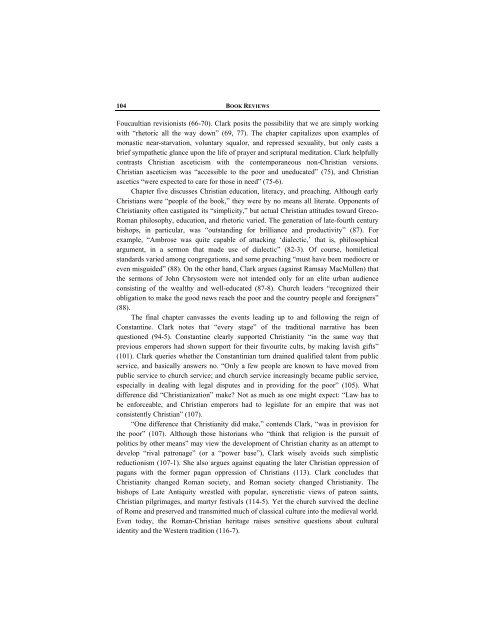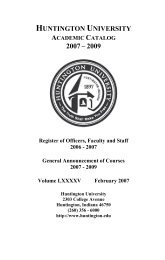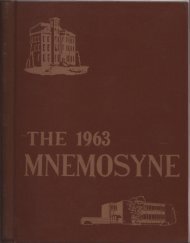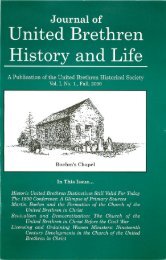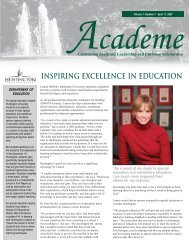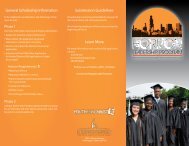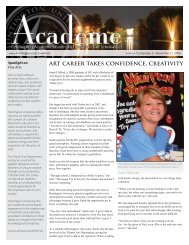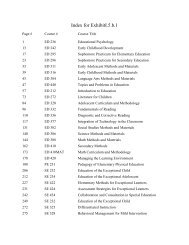Gillian Clark, Christianity and Roman Society - Huntington University
Gillian Clark, Christianity and Roman Society - Huntington University
Gillian Clark, Christianity and Roman Society - Huntington University
You also want an ePaper? Increase the reach of your titles
YUMPU automatically turns print PDFs into web optimized ePapers that Google loves.
104 BOOK REVIEWS<br />
Foucaultian revisionists (66-70). <strong>Clark</strong> posits the possibility that we are simply working<br />
with “rhetoric all the way down” (69, 77). The chapter capitalizes upon examples of<br />
monastic near-starvation, voluntary squalor, <strong>and</strong> repressed sexuality, but only casts a<br />
brief sympathetic glance upon the life of prayer <strong>and</strong> scriptural meditation. <strong>Clark</strong> helpfully<br />
contrasts Christian asceticism with the contemporaneous non-Christian versions.<br />
Christian asceticism was “accessible to the poor <strong>and</strong> uneducated” (75), <strong>and</strong> Christian<br />
ascetics “were expected to care for those in need” (75-6).<br />
Chapter five discusses Christian education, literacy, <strong>and</strong> preaching. Although early<br />
Christians were “people of the book,” they were by no means all literate. Opponents of<br />
<strong>Christianity</strong> often castigated its “simplicity,” but actual Christian attitudes toward Greco-<br />
<strong>Roman</strong> philosophy, education, <strong>and</strong> rhetoric varied. The generation of late-fourth century<br />
bishops, in particular, was “outst<strong>and</strong>ing for brilliance <strong>and</strong> productivity” (87). For<br />
example, “Ambrose was quite capable of attacking ‘dialectic,’ that is, philosophical<br />
argument, in a sermon that made use of dialectic” (82-3). Of course, homiletical<br />
st<strong>and</strong>ards varied among congregations, <strong>and</strong> some preaching “must have been mediocre or<br />
even misguided” (88). On the other h<strong>and</strong>, <strong>Clark</strong> argues (against Ramsay MacMullen) that<br />
the sermons of John Chrysostom were not intended only for an elite urban audience<br />
consisting of the wealthy <strong>and</strong> well-educated (87-8). Church leaders “recognized their<br />
obligation to make the good news reach the poor <strong>and</strong> the country people <strong>and</strong> foreigners”<br />
(88).<br />
The final chapter canvasses the events leading up to <strong>and</strong> following the reign of<br />
Constantine. <strong>Clark</strong> notes that “every stage” of the traditional narrative has been<br />
questioned (94-5). Constantine clearly supported <strong>Christianity</strong> “in the same way that<br />
previous emperors had shown support for their favourite cults, by making lavish gifts”<br />
(101). <strong>Clark</strong> queries whether the Constantinian turn drained qualified talent from public<br />
service, <strong>and</strong> basically answers no. “Only a few people are known to have moved from<br />
public service to church service; <strong>and</strong> church service increasingly became public service,<br />
especially in dealing with legal disputes <strong>and</strong> in providing for the poor” (105). What<br />
difference did “Christianization” make? Not as much as one might expect: “Law has to<br />
be enforceable, <strong>and</strong> Christian emperors had to legislate for an empire that was not<br />
consistently Christian” (107).<br />
“One difference that <strong>Christianity</strong> did make,” contends <strong>Clark</strong>, “was in provision for<br />
the poor” (107). Although those historians who “think that religion is the pursuit of<br />
politics by other means” may view the development of Christian charity as an attempt to<br />
develop “rival patronage” (or a “power base”), <strong>Clark</strong> wisely avoids such simplistic<br />
reductionism (107-1). She also argues against equating the later Christian oppression of<br />
pagans with the former pagan oppression of Christians (113). <strong>Clark</strong> concludes that<br />
<strong>Christianity</strong> changed <strong>Roman</strong> society, <strong>and</strong> <strong>Roman</strong> society changed <strong>Christianity</strong>. The<br />
bishops of Late Antiquity wrestled with popular, syncretistic views of patron saints,<br />
Christian pilgrimages, <strong>and</strong> martyr festivals (114-5). Yet the church survived the decline<br />
of Rome <strong>and</strong> preserved <strong>and</strong> transmitted much of classical culture into the medieval world.<br />
Even today, the <strong>Roman</strong>-Christian heritage raises sensitive questions about cultural<br />
identity <strong>and</strong> the Western tradition (116-7).


